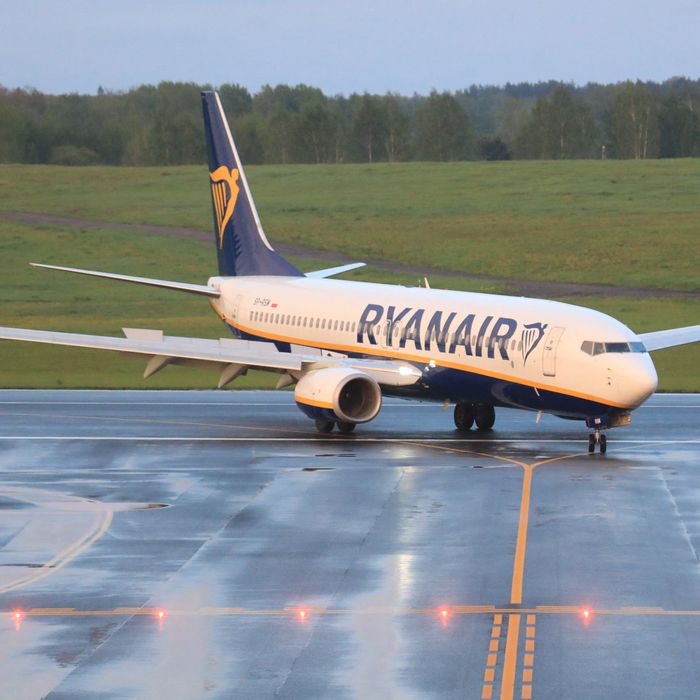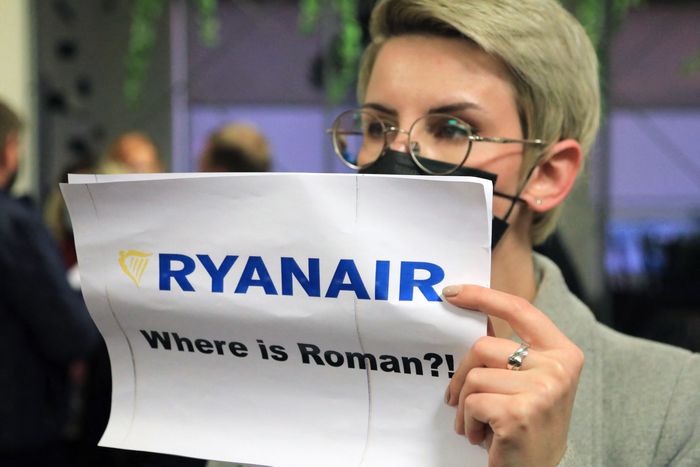
Ryanair Flight FR4978 after landing at Vilnius International Airport on Sunday night.
Photo: Petras Malulas/AFP via Getty Images
Journalist Roman Protasevich, a prominent critic of Belarus’ authoritarian president, Aleksandr Lukashenko, left Athens, Greece, on Sunday morning aboard a nonstop Ryanair flight to Vilnius, Lithuania, where Protasevich has been living in exile out of fear of arrest and imprisonment in Belarus. He never arrived. Near the end of the flight, while the plane and its 170 passengers were traveling through Belarusian air space, it was diverted to Minsk for an emergency landing — where Protasevich and his companion were detained before the flight continued on to its final destination. Both Belarus and Ryanair say the diversion from the flight plan was over a purported bomb threat, and Lukashenko’s press service claims he ordered a MiG-29 fighter jet to escort the plane to Minsk — which was at the time further away than Vilnius. Multiple European leaders are now calling the unprecedented incident a state-sponsored hijacking and kidnapping — and it may have significant implications for international air travel. Below is what we know about what happened, the aftermath, and the potential consequences.
Ryanair Flight FR4978 departed Athens, Greece at 10:28 a.m. on Sunday carrying some 170 passengers for what should have been about a three-hour flight to Vilnius, Lithuania. According to Ryanair, while the plane was flying over Belarus, the country’s air traffic controllers informed the plane’s pilots of “a potential security threat on board” and diverted it to Minsk, which was much farther away than Vilnius at the time:
A statement from the regime in Belarus claimed that it received a bomb threat while the plane was in Belarusian airspace, and president Aleksandr Lukashenko personally ordered the plane to “do a U-turn and land” — and ordered a MiG-29 fighter jet to escort it. Belarus’ deputy air force commander Andrei Gurtsevich claimed that the plane’s crew made the decision to land in Minsk — which Ryanair’s statement seems to refute.
Roman Protasevich and his companion were detained by authorities after the plane landed in Minsk. In a now deleted statement on Telegram, Belarus’s information ministry announced that Protasevich was arrested. The regime also announced that no bomb was found on board, and went so far as to say it was opening a criminal investigation into the false threat.
The plane spent about seven hours on the ground, during which passengers were told to disembark while authorities inspected the aircraft. The flight eventually departed and continued on to Vilnius, where it landed 35 minutes later, at 9:25 p.m. local time. It had been scheduled to arrive at 1 p.m.
One passenger told the Associated Press that Protasevich was visibly afraid after the pilot announced the diversion of the flight:
I saw this Belarusian guy with girlfriend sitting right behind us. He freaked out when the pilot said the plane is diverted to Minsk. He said there’s death penalty awaiting him there. … We sat for an hour after the landing. Then they started releasing passengers and took those two. We did not see them again.”
An unnamed passenger told the Lithuanian news site Delfi that Protasevich “was taken aside” at the airport in Minsk, “and they threw his belongings onto the runway … He was already calmer, but trembling. An officer was standing next to him all the time, and soon the officers just came and took him away.”
Tadeusz Giczan, the current editor-in-chief of the opposition Telegram channel Protasevich co-founded, NEXTA, alleged on Twitter that agents from Belarus’ KGB security service (it kept its Soviet-era name) were also on the flight. Protasevich had also said in Telegram messages that a suspicious-looking person had taken photos of him at the airport in Athens. A senior adviser to Belarusian opposition leader Sviatlana Tsikhanouskaya tweeted that Belarusian state media had also reported at one point that the plane was ordered to divert because of a conflict between a passenger and a member of the crew.
Roman Protasevich, the former chief editor of the Telegram channel Nexta, in 2020.
Photo: Michal Fludra/NurPhoto via Getty Images
Protasevich, 26, is the co-founder and former editor-in-chief of the NEXTA Telegram channel, which is one of the most popular opposition media outlets in Belarus. NEXTA, which along with a played an instrumental role in the mass protests that broke out against Belarus’ strongman president Aleksandr Lukashenko last year after he claimed victory in the country’s disputed presidential election. Most of the independent media organizations in Belarus were forced to shut down as a result of the protests, but Telegram remained uncensored amid the crackdown. NEXTA’s popularity and reach made its founders some of the regime in Belarus’ most-wanted, explains ABC News:
The outlet helped coordinate the largely leaderless demonstrations and published videos of them and police violence that helped catalyze the protests, which saw hundreds of thousands peacefully take to the streets calling for Lukashenko to step down. It and its sister channel NEXTA Live have close to 2 million subscribers.
Belarus’ authorities placed Protasevich on a terrorism watchlist last year and have opened criminal cases against him on charges of organizing mass riots and inciting hatred, offenses that carry sentences of up to 12 to 15 years in prison. Belarus’ opposition have said they fear he could now face the death penalty. NEXTA is based in Warsaw, Poland, where its offices are kept under police protection.
Protasevich has been living in exile in Lithuania for the last few years, but has still be active in the opposition movement. He had reportedly been in Greece this weekend attending an economic conference with, and reporting on, Belarusian opposition leader Sviatlana Tsikhanouskaya. He was apparently traveling back to Lithuania on Sunday with his girlfriend, who had accompanied him on the trip.
NEXTA staff said they immediately revoked Protasevich’s access to the channel on Sunday after the news of his arrest, so Belarus authorities would not have access to the channel’s subscriber data.
Belarus’ actions on Sunday prompted immediate outrage and condemnation from numerous world leaders and diplomats.
Ursula von der Leyen, the president of the E.U.’s European Commission, warned that “the outrageous and illegal behavior of the regime in Belarus will have consequences.”
U.S. Secretary of State Antony Blinken said that the U.S. “strongly condemn[s] the Lukashenka regime’s brazen and shocking act to divert a commercial flight and arrest a journalist. We demand an international investigation and are coordinating with our partners on next steps.”
Lithuania, which unlike Belarus is a member of the E.U., described the plane as being “hijacked by military force,” which represents an
“unprecedented attack against the international community.” Prime Minister Gitanas Nauseda called for Belarus to release Protasevich, for E.U. airports to deny access to Belarusian aircraft, and for Belarusian airspace to be declared unsafe. Greece’s foreign ministry called the incident a “state hijacking” as well.
“Not a single person who flies over Belarus can be sure of his safety,” responded Belarisian opposition leader Sviatlana Tsikhanouskaya, who has herself flown through the country’s airspace — aboard Ryanair — while in exile.
The International Civil Aviation Organization, a UN agency which coordinates international aviation laws, said in a statement that it was “strongly concerned by the apparent forced landing of a Ryanair flight and its passengers, which could be in contravention of the Chicago Convention,” the 1944 accord which established the principles and rules of airspace and international air travel.
In Russia, however, there has been some praise of how Lukashenka — who counts Russian president Vladimir Putin as his biggest international supporter — plucked one of his opponents from the sky, as the New York Times notes:
In Russia — where the state media described last year’s uprising against Mr. Lukashenko as a Western plot — the arrest met with approval among Mr. Putin’s supporters. Margarita Simonyan, editor of the pro-Kremlin RT television network, wrote on Twitter that Mr. Lukashenko “played it beautifully.” And Vyacheslav Lysakov, a member of Parliament allied with Mr. Putin, described Mr. Protasevich’s arrest as a “brilliant special operation.”
A woman stands with a poster reading ‘Where is Roman (Protasevich)?!’ in the arrival area as passengers disembarked from FR4978 at Vilnius International Airport on Sunday.
Photo: Petras Malukas/AFP via Getty Images
The low-budget Irish airline released a statement on Sunday night noting the safe arrival of Flight FR4978 in Vilnius, acknowledging the supposed security threat — noting “nothing untoward was found aboard the aircraft” — and apologizing to “all affected passengers.” But the statement said nothing about a fighter plane, or the fate of Protasevich and his companion:
Though it appears Ryanair is in communication with aviation authorities over the incident, the information missing from its statement did not go unnoticed — and prompted criticism across social media.
Then again, if the Ryanair pilots were, in fact, facing off against a MiG-29 — it’s not clear what choice they had in the matter.
That’s not yet clear, but it has definitely now become an open question whether or not it is safe for commercial aircraft to fly over Belarus. And as the Washington Post points out, “Flights in Northern and Eastern Europe often try to avoid Russian airspace. If Belarusian airspace is also a no-go, north-south flights in Europe could become quite circuitous.”



